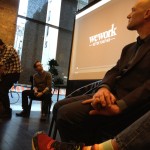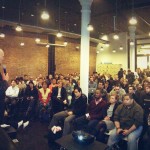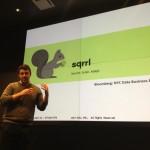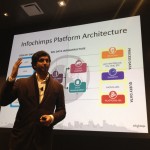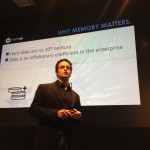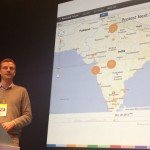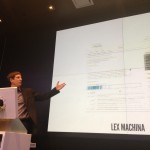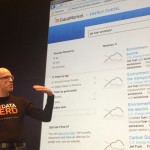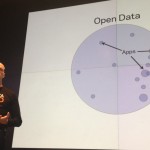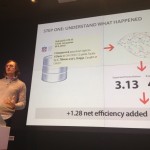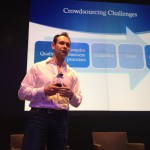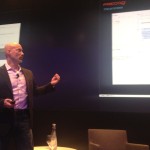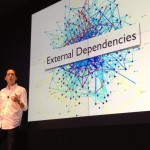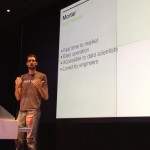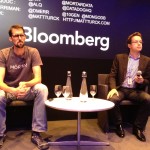The rise of Berlin as an entrepreneurial center is not exactly news, and a number of U.S. VC funds or angel investors have been active there for a while. My overall impression, however, is that many U.S.-based entrepreneurs and investors have only a fuzzy idea about what is going on over there, and arguably in Europe in general – a missed opportunity in my opinion, and perhaps one of the several reasons why Europe is still a largely underserved opportunity in terms of venture capital investment. The globalization of entrepreneurship has been one of the key trends in our industry. At this stage, there’s enough evidence of global success stories coming out of Europe that smart U.S. investors should be routinely investing in the area, despite the traditional issues associated with early stage investing in Europe (multiple markets, multiple languages, tax and regulatory issues, different attitudes towards risk/failure, etc.).
From that perspective, I thought it might make sense to share notes (very much in note format) from recent travel to Berlin (among other reasons to speak at Data Days, a fun event) and a number of conversations with Berlin-based entrepreneurs and investors in other contexts. This is meant to be a “beginner’s guide” for outsiders like me, not the ultimate reference on the topic.
Overall, there’s plenty of reasons to be excited about Berlin. While some claim that the real action has already moved on to other locations (like Istanbul), the Berlin tech ecosystem is still early, and in many ways trailing other emerging global tech centers like London and NYC, probably by a few years. The fundamentals, however, are encouraging, particularly considering that the government (very active both in London and NYC) has been largely absent from the development of the Berlin ecosystem, so pretty much everything that has been happening there so far has been driven by raw, grassroots entrepreneurial energy.
Many thanks to Christophe Maire (currently CEO of Txtr), Jess Erickson (General Assembly Berlin), Koen Lenssen (Tengelmann Ventures) and Saskia Ketz (SumAll) for reviewing this post.
Key characteristics
Unique
- Just like New York or San Francisco are not like the rest of the U.S., Berlin is not like the rest of Germany
- Artistic (buoyant contemporary art scene), rebellious culture (or “counterculture”), which seems to translate well into design talent
- Innovative and fun (renowned nightlife)
- Cheap, large apartments – particularly compared to tech centers like London, NYC or SF where finding affordable housing is an extraordinary challenge. Some say that this won’t last long if Berlin continues on its current trajectory; at the same time, the city is very large and housing supply may exceed demand for a while.
- Socially open, no class system, left leaning with an openly gay mayor (Klaus Wowereit) from the SPD (social democratic party), in power since 2001.
- Capital of one of the world’s largest economy, yet due to history, no local industry – local talent does not have many other options
- Traditional economic centers in Germany such as Munich, Frankfurt and Hamburg lag behind in terms of tech startup activity – which doesn’t mean that those cities do not have interesting companies: for example, Hamburg seems to have a gaming cluster (Bigpoint, Innogames, GoodGames, etc.), and both Facebook and Google have offices there; Munich has West Wing (online shopping club for Home & Living, received $50M of investment in June 2012), Frankfurt/Wiesdaben is active in social entrepreneurship (Hans Reitz/Grameen). But Berlin seems to have strong gravitational pull; for example, when airbnb arrived in Europe, it set up shop in Hamburg after acquiring German clone Accoleo , but subsequently moved moved all operations to Berlin. Twitter also chose Berlin over other German cities to base its operations. MTV has been there since 2004 (after moving from Munich).
Immigrant-friendly
- Part of the European Union (doesn’t solve all labor laws issues, but helps tremendously in terms of recruiting talent from other EU countries)
- Just about everybody seems to speak English
- International founders: perhaps ironically, a number of Berlin startups, including some of the most prominent ones, were founded or co-founded by non German nationals, including Souncloud (Swedish founders), Gidsy (Dutch founders), Amen (one American co-founder), Incrediblue (Greek founders), Readmill (Swedish founder), GoEuro (American), rules.io (American), GetYourGuide (Swiss), etc.
Solid supply of technical talent
- For now at least, there’s much less of a talent war than in other tech hubs, particularly SF and NYC, but some say it is changing fast.
- Strong German work ethic (one of the reasons for an overall low employee turnover, together with restrictive laws around employment termination and the German social structure in general).
- Solid universities, although fairly theoretical: Humboldt, Technical University, Freie Universiat. Berlin also has two of Germany’s top art and design universities: UdK and Weißensee
- Geographically close to cheap talent: Leipzig, Warsaw, etc.
- There’s some history of large tech companies like Siemens having a strong presence in Berlin, but by the sound of it, at this stage startups are the only game it town in terms of recruiting top technical talent
Increasingly solid community infrastructure
- Lots of co-working spaces: Agora Collective, Ahoy, Betahaus, ClubOffice, Co.Up, LaunchCo, Mobilesuite, Raumstation, St Oberholz, Tante Renate, etc – some spaces are essentially cafes, others are actual office spaces with scheduled activities.
- More on the way: The Factory
- Several accelerator programs: StartupBootcamp Berlin, Mcube, Hubraum, Project A, YouIsNow, Berlin Startup Academy
- Education: General Assembly now offers enterpreneurship courses in collaboration with BetaHaus
- Press: Berlin has its own industry blogs, including Venture Village and Silicon Allee. Techcrunch (largely Mike Butcher) covers extensively Berlin startups.
Still early:
- While it’s been growing for a few years now, the tech ecosystem still generally feels early, compared to London or NYC
- Berlin was always known for hacker culture (chaos computer club) leading to cutting edge outfits in 90’s (art+com, convergence, gate5).
- Started with the Samwer brothers – was a mixed blessing for Berlin. While starting successful businesses, they perfected the art of the startup copycat (with the resulting bad reputation). Examples: StudiVZ (Facebook clone), Citydeal (Groupon clone, assets acquired by Groupon), Zalando (originally a Zappos clone, has expanded beyond shoes since), Wimdu (airbnb clone)
- Now produces original startups (readmill, researchgate, goEuro, etc.), with an increasing number with global relevance and aspirations (SoundCloud)
- Berlin seems still mostly focused on consumer internet companies (with a good amount of mobile plays), with comparatively fewer B2B or enterprise startups; it is not a full ecosystem yet from that perspective, with some exceptions like cloudControl (European PaaS provider)
- While there is a fair distribution of startups across the stages (from seed to late stage), overall the ecosystem is too recent to have a very solid track record of exits. Some examples: ImmoScout (sold to DT for €450m), Idealo (a comparison shopping site, acquired by Axel Springer in 2006), gate5 (today “nokia Maps” employing 800 people in Berlin), StudiVZ (sold to one of its investors, Georg von Holtzbrinck Publishing Group, for €85 million in 2007), MyphotoBook (sold to Holtzbrink), Nugg.ad (provider of predictive behavioral targeting solutions for digital advertising, acquired by Deutsche Post in 2010 for €50M), KaufDa (local search and local promotion search, acquired by Axel Springer), Zanox (acquired by Springer for €250m), Casacanda (online shopping club for daily design inspirations, acquired by Fab.com in February 2012 in an all-stock deal valuing the company at around $10M), Brands4Friends (sold to eBay for €150m, etc.)
- Sounds like the government hasn’t quite caught on – in starck contrast to London or NYC. The success of the Berlin ecosystem seems to have been entirely driven by a grassroot, community effort.
- There’s less VC money available than in other places like NYC (or to some extent London); companies tend to be very capital efficient and tend to monetize early .
- One point people disagreed about: some say the ecosystem is still a bit “clique-ish”, the community hasn’t yet completely geled as a full integrated, selflessly supportive environment (at least compared to SF or NYC) –others disagreed, citing Berlin’s community as one of its key assets.
- Successful entrepreneurs are starting to give back to the ecosystem in the form of active angel investments. Some notable examples: Dario Suter, Fabian Heilemann, Christophe Gras, Christophe Maire, Christian Vollman, Marco Börries, Martin Sinner, Lukasz Gadowski, Michael Brehm, etc.
- Rocket Internet (Samwer brothers) plays have alone raised close to 1bn in 2012 alone and breeds large number of 2nd generation entrepreneurs with international experience. Employs overall 10,000 people in Berlin alone.
- Team Europe, project-A and other Incubators breed ambitious international companies (Madvertise, Delivery hero, Sponsor pay)
Notable Startups
- Soundcloud: world’s leading social sound platform
- Amen: the place for creating and sharing opinions about the extra ordinary things in life.
- Gidsy: community marketplace for authentic experiences
- 6wunderkinder: multi-platform productivity solutions for individuals, groups and businesses
- Wooga: third largest social games developer in the world
- Delivery Hero: global network of online food ordering marketplaces
- Zalando: largest European eCommerce group (including shoes)
- 9flats (peer to peer apartment rentals)
- Lieferheld: platform for ordering and paying food online
- EyeEm: smart photo-sharing application for smartphones
- Txtr: distributed eBooks platform
- Readmill: social and shareable reading platform
- Researchgate: community for researcher and scientists
- MoviePilot: promotion platform for movies (DFJ esprit)
- Monoqi.com: highly curated commerce
- Other companies/products that came back in conversations: HelloFresh, Trademob, Travis-Cl, Fort Rabbit, Cobot.
Angels, seed investors, founder collectives or micro VCs
- Rocket Internet (Dealstreet, Wimdu, GlossyBox, Westwing, 21Diamonds, payleven)
- Team Europe (Delivery Hero, Lieferheld, Madvertise)
- Christophe Maire: Swiss serial entrepreneur, currently CEO of Txtr, investor in soundcloud, Amen, EyeEm, LoopCam, Appaware, PhoneDeck
- Klaus Hommels: Swiss leading European angel investor
- Ashton Kutcher: investor in Amen, Gidsy, Soundcloud
- Martin Sinner: MD at Idealo and active angel
VCs
- US funds: Highland (Wooga, getyourguide), Union Square Ventures (Soundcloud), Kleiner Perkins (Soundcloud), GGV (Soundcloud), RedPoint Ventures (9flats), JP Morgan (Zalando), kinnevik (RocketInternet), Benchmark, FounderFund (Researchgate), Spark Capital (getyourguide)
- International funds: Index Ventures (Soundcloud, Gidsy), Atomico (6Wunderkinder), Balderton (Wooga), DST Global (Zalando), Kite Ventures (Delivery Hero, Lieferheld), ru-Net (Lieferheld), Sunstone Capital (Amen, Gidsy), Wellington Partners (EyeEm, Readmill), e.Ventures (9flats, kaufDa, Dealstreet), Passion Capital (EyeEm), Mangrove Capital Partners, Partech, b-to-v Partners, etc.
- German funds: Earlybird, HV Holtzbrinck, IBB (ClipKit, cloudControl), Earlybird Ventures, BMP Media Investors, Tengelmann Ventures, Dumont Venture, High Tech Gründerfonds (a public private partnership with 10+ corporate investors, currently investing out of a €293.5 million fund), GMPVC (German Media Pool, invested in 9flats).
- Corporates: BDMI, T-Venture (ClipKit, 9flats, 6Wunderkinder).
